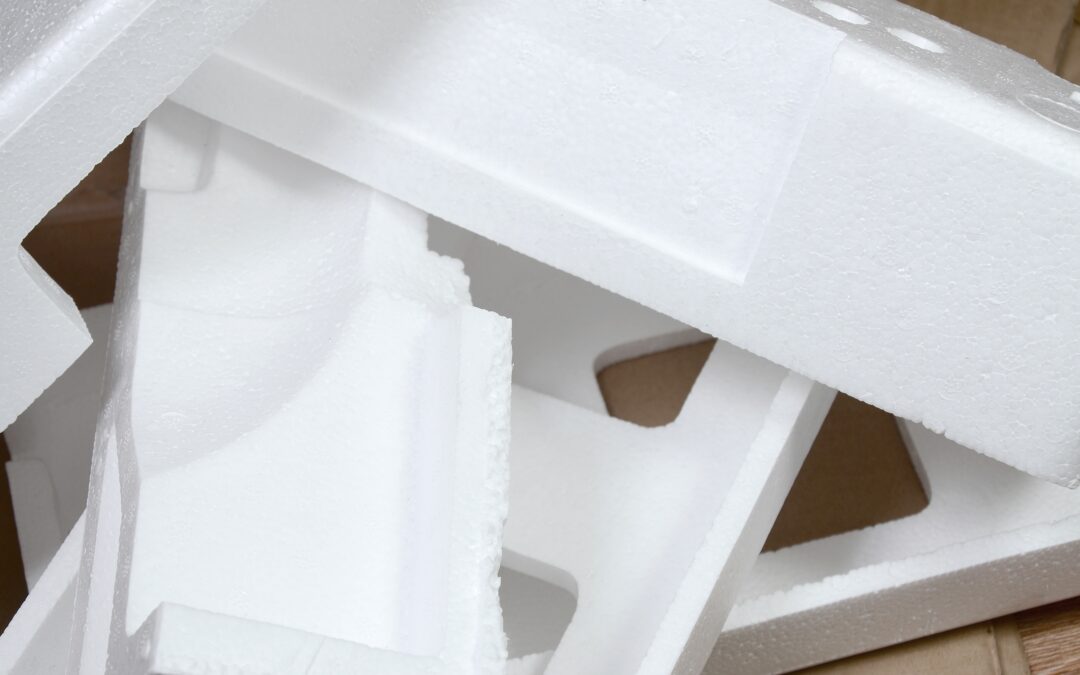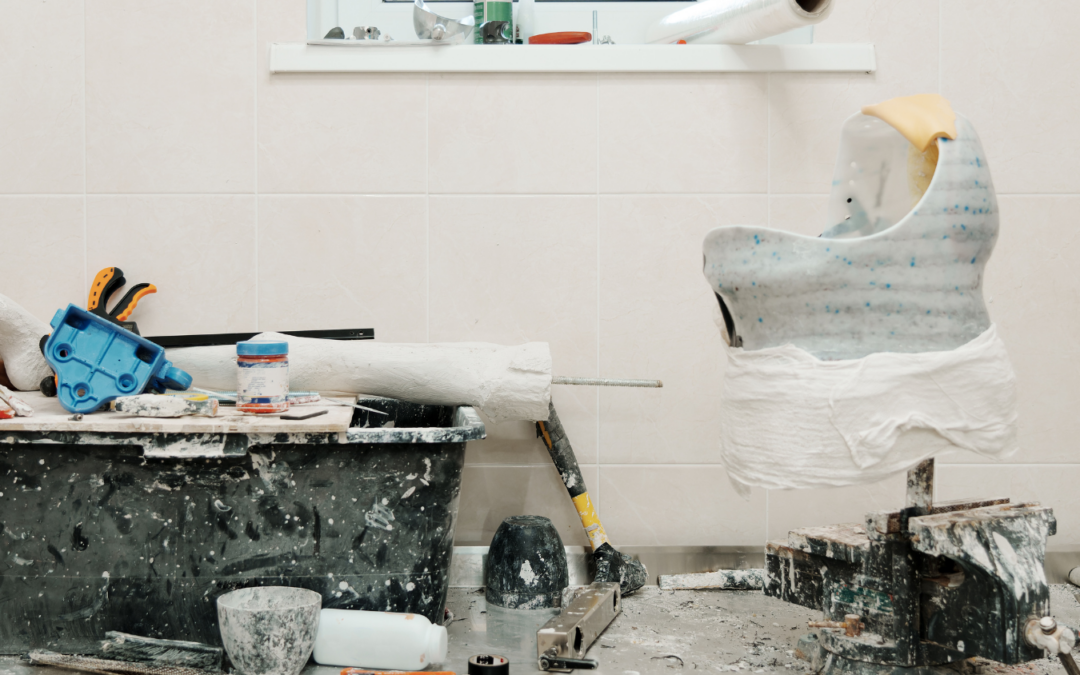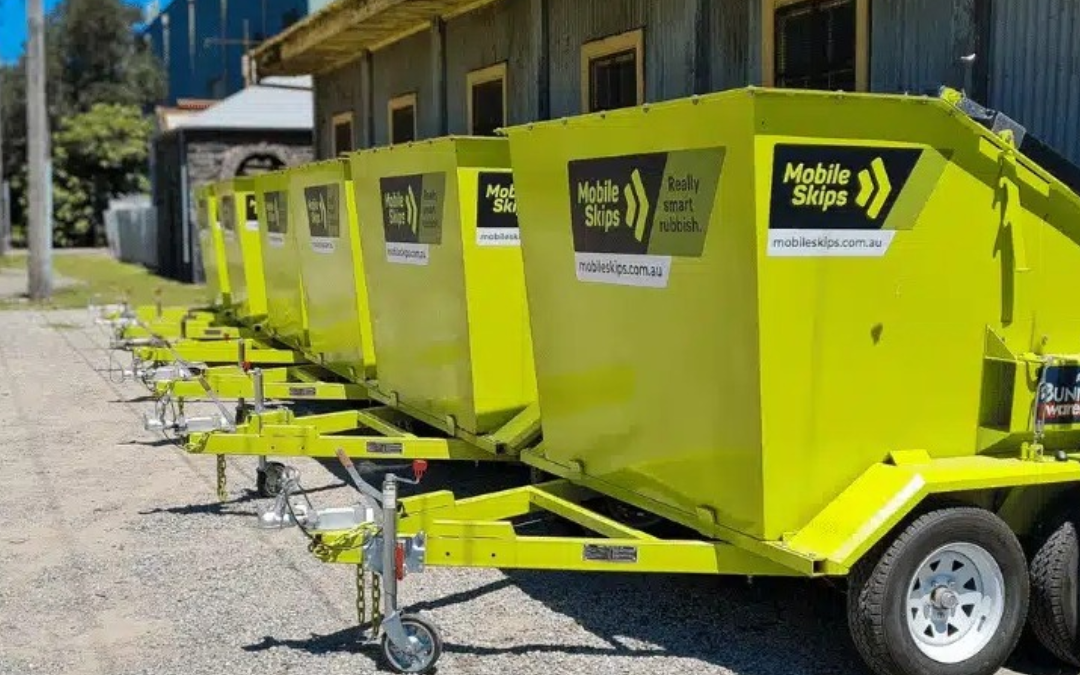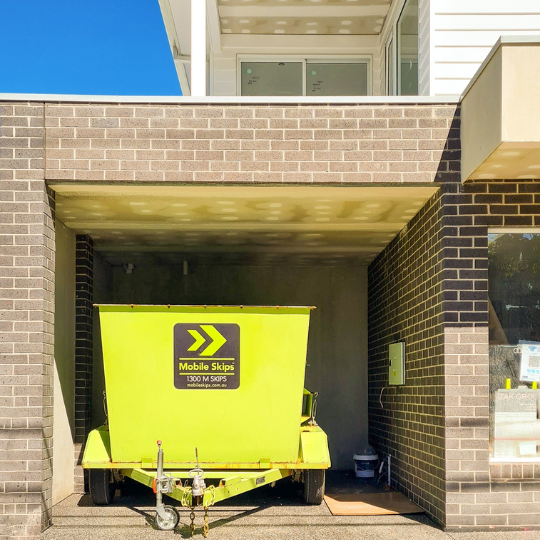Why Proper Disposal of Electrical and Plumbing Waste Is Essential
Electrical plumbing systems are vital parts of any home renovation, but they also generate specific types of waste that need to be handled carefully. From outdated wiring to old pipes and fixtures, managing this waste safely and efficiently is crucial to keeping your renovation on track and avoiding environmental hazards.
It’s important to recognize the types of waste generated and why proper disposal is vital. Electrical waste includes old wiring, light fixtures, switches, outlets, and cables. On the other hand, plumbing waste includes pipes (PVC, copper, steel), faucets, sinks, toilets, and water heaters.
Proper disposal of this waste not only ensures safety and environmental protection but also promotes sustainability. For instance, recycling old plumbing materials, such as copper and steel pipes, reduces landfill waste and promotes eco-friendly practices (Sustainability Guide for Plumbers). This aligns with Mobile Skips’ commitment to responsible waste removal and environmental restoration by planting a tree for every skip hire (Mobile Skips).
Recycling is highly recommended for both electrical and plumbing waste to minimise environmental impact. Consider using separate bins for recyclable materials. This will help maintain a clean and safe renovation site while promoting eco-friendly practices.
To efficiently manage renovation waste, Mobile Skips can provide quick delivery within 3 hours of booking and extend the hire period if necessary, ensuring your project remains on track (Mobile Skips). For more tips on renovating your home and managing waste, visit our articles on home renovation waste and removing renovation waste.
Types of Electrical and Plumbing Waste Generated During Renovations
| Type of Waste | Examples | Recycling Tip |
|---|---|---|
| Electrical Waste | Old wiring, light fixtures, switches, cables | Remove and separate copper wiring for recycling |
| Plumbing Waste | Pipes (PVC, copper, steel), sinks, toilets | Separate metal pipes and fixtures for recycling |
Proper disposal and recycling not only protect the environment but also promote sustainable and eco-friendly practices during your renovation project. To explore more about managing renovation waste, check out our guide on renovation waste and kitchen renovation waste.
Types of Electrical and Plumbing Waste Generated During Renovations
When undertaking a home renovation, you’re likely to encounter various types of waste, particularly when dealing with electrical and plumbing systems. Proper management of this waste is essential for safe and efficient disposal.
Electrical Waste
What It Includes
Electrical waste encompasses a range of old or outdated electrical components that need to be removed and disposed of during a renovation. This waste includes:
- Old wiring
- Light fixtures
- Switches
- Outlets
- Cables
| Electrical Waste Item | Recyclable |
|---|---|
| Old Wiring | Yes (Copper) |
| Light Fixtures | Yes (Remove bulbs) |
| Switches | Yes |
| Outlets | Yes |
| Cables | Yes |
Tip: Remove and separate copper wiring, which can be recycled, and dispose of non-recyclable materials safely.
Copper wiring is a valuable recyclable material. By stripping old wiring of its copper, you can recycle it effectively. For more detailed guidance on safely removing electrical components, refer to our guide on home renovation waste.
Plumbing Waste
What It Includes
Plumbing waste includes an array of materials used in the plumbing systems of your home, which may need to be replaced or disposed of during a renovation. Typical plumbing waste items include:
- Pipes (PVC, copper, steel)
- Faucets
- Sinks
- Toilets
- Water heaters
| Plumbing Waste Item | Recyclable |
|---|---|
| PVC Pipes | No |
| Copper Pipes | Yes |
| Steel Pipes | Yes |
| Faucets | Yes |
| Sinks | Yes |
| Toilets | Yes (if broken down) |
| Water Heaters | Yes (with care) |
Tip: Separate metal pipes and fixtures for recycling, and handle old water heaters with care to prevent environmental hazards.
Copper pipes are known for their durability and reliability, while PVC pipes are prized for their affordability and versatility. These materials should be sorted accordingly to facilitate recycling and disposal.
For additional tips on managing waste from plumbing fixtures and fittings, visit our section on bathroom renovation waste. If you need specific bin solutions, consider exploring our service options, including specialised waste removal, on our reno skip bin waste page.
By following the best practices for separating and disposing of electrical and plumbing waste, you can ensure that your renovation project remains safe, efficient, and eco-friendly.
Best Practices for Managing Electrical Waste
Use E-Waste Recycling Programs
E-waste recycling is a critical step in managing electrical waste during renovations. By using specialised recycling facilities, you can ensure that harmful substances do not end up in landfills. Recycling electrical wiring waste helps in conserving raw materials like copper and silver while reducing the need for new production.
What Can Be Recycled: Copper wiring, electrical cables, light fixtures, and switches
Take your old electrical components to an e-waste recycling facility to prevent toxic materials from entering the landfill.
Remove Wiring Safely
Old wiring can be perilous if not handled appropriately. Ensuring all power sources are off before starting removal is imperative to prevent accidents. Handling wiring waste responsibly also helps in decreasing pollution and conserving natural resources.
Why It’s Important: Handling old wiring can be dangerous if not done correctly, especially if it’s still connected to live electricity.
Always turn off the power at the breaker before removing any wiring. If you’re unsure, hire a licensed electrician to handle electrical removal.
Dispose of Light Bulbs and Batteries Separately
Light bulbs and batteries contain materials that can be harmful to the environment if disposed of improperly. Fluorescent bulbs, for example, contain mercury and should be handled with care. Use facilities specifically designed to recycle these items to ensure safe disposal.
What It Includes: Fluorescent bulbs, LED bulbs, and batteries
Bulbs and batteries should not go into regular bins or skips. Use dedicated recycling facilities to handle these items safely.
| Electrical Waste Type | Proper Disposal Method |
|---|---|
| Copper Wiring | E-waste recycling facility |
| Electrical Cables | E-waste recycling facility |
| Light Fixtures | E-waste recycling facility |
| Switches | E-waste recycling facility |
| Fluorescent Bulbs | Specialised recycling facility |
| LED Bulbs | Specialised recycling facility |
| Batteries | Specialised recycling facility |
It is also important to note that rubbish collection services by Mobile Skips include accepting electrical goods among the general rubbish list for disposal in their skip bins.
By following these best practices, you can manage electrical waste safely and efficiently during your renovation project. Always remember to plan ahead for your specialised waste disposal needs to keep your project running smoothly and compliant with safety standards. For more information on managing renovation waste, check out our articles on home renovation waste and kitchen renovation waste.
Best Practices for Managing Plumbing Waste
Recycle Metal Pipes and Fixtures
When managing plumbing waste, it is crucial to recycle metal pipes and fixtures. These materials include copper, steel, and aluminium pipes, faucets, and fixtures. According to Shamrock Plumbing, copper pipes are durable and reliable, making them a popular choice for both residential and commercial plumbing applications.
| Material | Recyclability | Common Uses |
|---|---|---|
| Copper | High | Plumbing, Hot Water Lines |
| Steel | High | Industry, Plumbing |
| Aluminium | High | Faucets, Fixtures |
Tip:
Separate recyclable metal pipes and fixtures from non-recyclable materials like PVC to reduce landfill waste. PVC pipes are widely used due to their affordability and versatility, but they should be handled differently from metal components.
Properly Dispose of Hazardous Materials
Handling hazardous materials requires extra caution. This includes old water heaters, treated pipes, or plumbing systems containing harmful chemicals. Improper disposal can lead to contamination of water sources, negatively impacting both human health and aquatic life (Clean Management).
Tip:
Contact a licensed hazardous waste removal service to dispose of materials that may contain harmful substances. This ensures that all hazardous components are handled in compliance with environmental regulations, protecting both your health and the environment.
Replace and Recycle Old Water Heaters
Water heaters can be large, bulky, and contain hazardous materials. Proper disposal is essential to avoid environmental hazards and free up space during a home renovation project.
| Component | Hazard | Disposal |
|---|---|---|
| Water Heaters | High | Recycle Centre/ Professional Service |
| Treated Pipes | Medium | Hazardous Waste Service |
| CPVC Pipes | Medium | Special Handling |
Tip:
Many recycling centres accept water heaters and will safely dismantle and recycle the parts. Should your local centre not offer this service, hire a professional waste service to remove it. CPVC pipes, which withstand higher temperatures, should be disposed of with care to avoid environmental hazards (Shamrock Plumbing).
By following these best practices, you can responsibly manage plumbing waste during your renovation, ensuring the process is both eco-friendly and compliant with safety standards. For further guidance on handling waste during renovations, explore our articles on bathroom renovation waste and renovation clean-up.
What Can Go in a Skip Bin for Electrical and Plumbing Waste?
Knowing what is acceptable for disposal in a skip bin can simplify your home renovation waste management. Different types of materials require different handling, so it’s essential to sort them correctly. Here’s a breakdown of what you can and cannot place in a skip bin for electrical and plumbing waste.
What Can Go in a Skip
Accepted: Metal pipes, faucets, sinks, light fixtures (without bulbs), and switches
You can dispose of various metal and non-hazardous electrical and plumbing items in a skip bin. These include:
- Metal pipes (copper, steel, aluminium)
- Faucets and taps
- Sinks and basins
- Light fixtures (excluding bulbs)
- Electrical switches
| Item | Type | Skip Acceptable? |
|---|---|---|
| Metal pipes | Copper, steel, aluminium | Yes |
| Faucets and taps | Metal and plastic | Yes |
| Sinks and basins | Porcelain, metal, composite | Yes |
| Light fixtures | Metal and plastic (no bulbs) | Yes |
| Electrical switches | Plastic and metal | Yes |
Tip: Break down larger items like sinks and toilets to make the most of the space in your skip bin.
For more advice on managing your home renovation debris, visit our page on renovation waste.
Make your home renovation safer and more efficient by understanding what can be disposed of in a skip bin and the best practices for managing electrical and plumbing waste. For comprehensive advice on handling hazardous materials, hazardous waste, and recycling options, refer to our detailed guides on sustainable waste removal and removing renovation waste.
When Mobile Skips May Not Be Suitable for Electrical or Plumbing Waste
Large or Hazardous Items
What It Includes: Water heaters, large quantities of wiring, or hazardous plumbing systems
Mobile skips are highly versatile and convenient for managing home renovation waste. However, they have limitations when it comes to large or hazardous items, particularly when dealing with electrical plumbing waste. Items such as water heaters, large quantities of wiring, and hazardous plumbing systems fall outside the scope of what’s typically accepted in mobile skips.
| Item Type | Skip Bin Suitability |
|---|---|
| Water Heaters | Not Suitable |
| Hazardous Plumbing Systems | Not Suitable |
| Metal Pipes | Suitable |
| Faucets and Sinks | Suitable |
| Light Fixtures (without bulbs) | Suitable |
| Switches | Suitable |
Why It Matters: Mobile Skips are ideal for most small to medium electrical and plumbing waste, but for larger items or hazardous materials, you may need specialized waste services
Disposing of large and hazardous items properly is crucial for both environmental and safety reasons. Mobile skips can effectively handle most small to medium-sized renovation waste, but larger and hazardous items require specialized waste services for proper disposal. For example, water heaters, which are bulky and may contain hazardous materials, should be managed with care (Mobile Skips).
Hazardous materials pose significant risks to health and the environment if not disposed of correctly. Items like asbestos, chemicals, batteries, paint, and poisons should never be placed in a skip bin (Mobile Skips). They require specialized handling to ensure they are removed safely.
Tip: If your project generates hazardous waste or large, bulky items, contact a licensed hazardous waste service to handle these components safely
For projects that involve significant amounts of electrical plumbing waste or hazardous materials, it’s recommended to enlist a licensed hazardous waste service. These professionals have the equipment and expertise necessary to handle large and dangerous items safely, ensuring compliance with environmental regulations and keeping your renovation site secure.
Proper planning is key to managing bathroom renovation waste and other types of renovation debris. While mobile skips can handle a wide range of materials, always consider the size and potential hazards of your waste to determine if specialized services are needed.
By staying informed about what can be placed into a mobile skip and when to seek additional help, you can ensure that your diy renovation projects are both efficient and environmentally responsible. For more tips on managing your renovation waste, visit our guides on removing renovation waste and sustainable waste removal.
How to Safely Manage Electrical and Plumbing Waste on Site
Wear Protective Gear
Why It’s Important
Handling sharp or hazardous materials like wires, metal pipes, and old fixtures can lead to injury. Ensuring safety while managing electrical plumbing waste during renovations is paramount.
Tip
Always wear gloves, safety glasses, and appropriate protective clothing when dealing with electrical and plumbing waste. This gear will protect you from cuts, abrasions, and potential exposure to harmful substances. For added safety, consider using heavy-duty gloves and steel-toed boots when handling bulky items like water heaters or large metal pipes. More safety tips for renovations can be found in our guide to renovation waste.
Keep Electrical and Plumbing Waste Separate
Why It’s Important
Electrical and plumbing waste require different disposal methods. Mixing these types of waste can make recycling and safe disposal more complicated and less efficient.
Tip
Organise your waste by type, separating electrical components from plumbing waste, to make disposal more efficient and eco-friendly. Use separate bins or designated areas for each type of waste. For example:
| Waste Type | Suggested Disposal Method |
|---|---|
| Electrical | E-waste recycling facilities for items like wiring, switches, and light fixtures (RS Andrews) |
| Plumbing | Recycling centres for metal pipes and fixtures, and licensed services for hazardous materials (RS Andrews) |
By keeping your waste streams separate, you can ensure that items like recyclable copper wiring and reusable metal pipes are directed to the appropriate facilities, reducing environmental impact. For tips on handling specific waste types, take a look at our articles on kitchen renovation waste and bathroom renovation waste.
For more insights, refer to our comprehensive guide on safely managing home renovation waste. This will keep your project safe while adhering to environmental best practices.
One Last Tip: Plan Ahead for Specialised Waste Disposal
Proper handling and disposal of electrical and plumbing waste during your renovation project is crucial. These types of waste often require specialised disposal methods, so it’s important to plan for these needs before your renovation begins.
Electrical and plumbing waste often require specialised disposal methods, so it’s important to plan for these needs before your renovation begins.
To effectively manage waste from your renovation, follow these steps:
- Book a Mobile Skip: Mobile Skips can be highly effective for recyclable and general debris. Electrical goods, like old wiring and light fixtures, are accepted in both the Standard Skip Bin (500kg) and the Heavy Skip Bin (1000kg) as part of general rubbish (Mobile Skips). However, you will need to plan for the separate disposal of e-waste and hazardous materials.
- Separate E-Waste: E-waste recycling programs accept items like copper wiring, electrical cables, light fixtures, and switches. By recycling these components, you prevent hazardous materials from ending up in landfills (sustainable waste removal).
- Hazardous Materials and Large Items: Materials such as old water heaters, treated pipes, and certain plumbing systems require specialised disposal services due to the potential environmental hazards they pose. Large and bulky items may not fit in standard skip bins; for these, it’s recommended to hire a professional waste service (how to dispose of and recycle old plumbing).
Pro Tip: Book a Mobile Skip for recyclable and general debris, but plan for separate disposal of e-waste, hazardous materials, and larger items like water heaters. This will help keep your site safe and your project running smoothly.
Proper planning ensures that you manage your renovation waste efficiently and responsibly. Knowing what to dispose of separately will help you avoid any legal or environmental issues. By keeping your waste organised, you also streamline your renovation process, making it easier to manage and dispose of waste through appropriate channels.
For more detailed guidelines on managing different types of renovation waste, check out our articles on home renovation waste, kitchen renovation waste, and bathroom renovation waste.
Final Thoughts on Managing Electrical and Plumbing Waste During Renovations
Electrical and plumbing waste require careful handling and disposal during any renovation. By recycling what you can and using specialised waste removal services for hazardous items, you can keep your renovation eco-friendly and compliant with safety standards. Mobile Skips can help with most of your debris, but be sure to plan ahead for items that need special handling.
Recycling and Disposal Importance
Recycling electrical wiring waste helps in conserving raw materials like copper and silver, reducing the need for new production materials (Christian Brothers). Proper disposal not only prevents hazardous chemicals from entering the landfill but also complies with environmental regulations.
Using Mobile Skips Efficiently
Mobile Skips can effectively handle a variety of home renovation waste, including metal pipes, faucets, and fixtures. By segregating your waste into recyclables and non-recyclables, you can make the most out of your skip bin.
| Waste Type | Can Go in Skip | Special Handling |
|---|---|---|
| Metal Pipes | Yes | No |
| Faucets & Sinks | Yes | Break down large items for space |
| Light Fixtures (without bulbs) | Yes | No |
| Wiring | yes | No |
| Batteries & Bulbs | No | Use dedicated recycling facilities |
| Hazardous Materials | No | Contact hazardous waste disposal service |
| Water Heaters | Yes | No |
Plan Ahead for Specialised Waste Disposal
Before beginning your renovation project, it’s essential to identify the types of waste that will be generated. Organise the necessary services for e-waste, hazardous materials, and large items like water heaters. This preparation will ensure that you comply with safety and environmental regulations while keeping your renovation waste under control. For more tips on handling bathroom renovation waste and other specific types, check our articles on kitchen renovation waste and roofing renovation waste.
By following these practices, you can manage your house renovation waste efficiently, ensuring a safe and environmentally-friendly renovation project.






